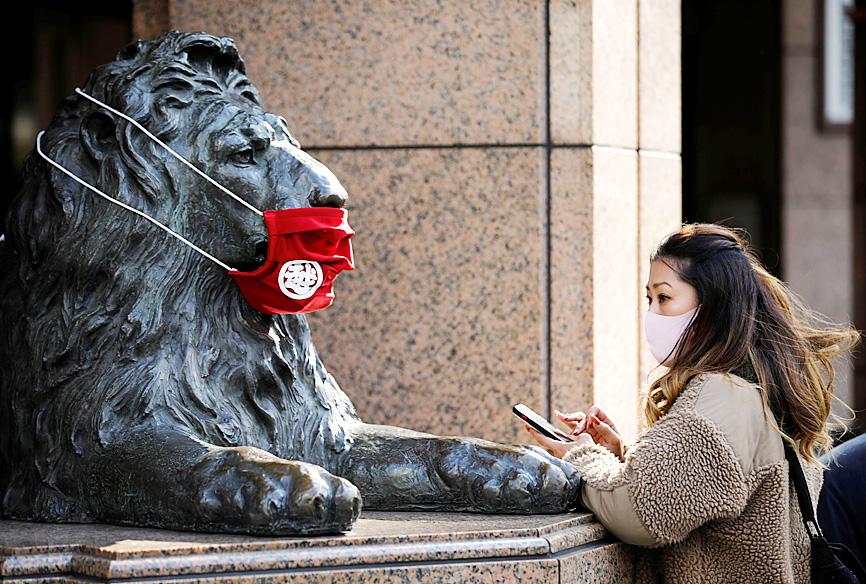Confidence among major Japanese manufacturers has recovered further after plunging on COVID-19 pandemic woes to its worst level since the global financial crisis, a key survey showed yesterday.
The Bank of Japan’s (BoJ) quarterly poll of about 10,000 firms — known as the Tankan business survey — is month showed a reading of minus-10 among big manufacturers, after recording minus-27 in the previous survey and minus-34 in the June survey.
The latest figure compared with a market consensus estimate of minus-15.

Photo: Reuters
The June figure was the lowest since June 2009 when worldwide financial shocks hammered the planet’s third-largest economy.
The short-term business sentiment survey reports the difference between the percentage of firms that are upbeat and those that see conditions as unfavorable.
A negative reading means more companies are pessimistic than optimistic. It is considered to be the broadest indicator of how Japan Inc is faring.
The latest reading comes after the government last week approved more than US$700 billion in fresh stimulus to fund projects from anti-coronavirus measures to green tech, the country’s third such package this financial year.
“The sharp rebound in the Q4 Tankan supports our view that Japan’s economy will rebound relatively swiftly from the dislocation caused by the pandemic,” Capital Economics Ltd economist Tom Learmouth said in a commentary.
Japan officially exited recession last month after three quarters of contraction, but it now faces a spike in COVID-19 infections, with record numbers of new cases reported in the past few weeks.
The latest survey also comes ahead of the bank’s two-day monetary policy meeting from Thursday, which is widely expected to keep the current monetary easing tools, but also likely to extend its special measures in response to COVID-19.
“We think the BoJ will explain that the economy continues to need policy support, especially with higher uncertainty due to the arrival of a third wave of infections,” UBS economists Masamichi Adachi and Go Kurihara said in a report.
Confidence among big nonmanufacturers improved to minus-5 — against a market consensus of minus-6 — after logging minus-12 in September.
The latest figures show a steady recovery from the low of minus-17 in June, but are still well below the March figure of plus 8.
Japan was struggling with the effects of natural disasters and a hike in consumption tax even before the pandemic crippled the global economy.
Once it hit, there were no mandatory lockdowns in the country, with the government instead asking people to stay at home — a request that was largely heeded.
That, coupled with a shuttering of the country’s borders, battered tourism and consumer spending, with the hospitality industry hit particularly hard.

NEW IDENTITY: Known for its software, India has expanded into hardware, with its semiconductor industry growing from US$38bn in 2023 to US$45bn to US$50bn India on Saturday inaugurated its first semiconductor assembly and test facility, a milestone in the government’s push to reduce dependence on foreign chipmakers and stake a claim in a sector dominated by China. Indian Prime Minister Narendra Modi opened US firm Micron Technology Inc’s semiconductor assembly, test and packaging unit in his home state of Gujarat, hailing the “dawn of a new era” for India’s technology ambitions. “When young Indians look back in the future, they will see this decade as the turning point in our tech future,” Modi told the event, which was broadcast on his YouTube channel. The plant would convert

‘SEISMIC SHIFT’: The researcher forecast there would be about 1.1 billion mobile shipments this year, down from 1.26 billion the prior year and erasing years of gains The global smartphone market is expected to contract 12.9 percent this year due to the unprecedented memorychip shortage, marking “a crisis like no other,” researcher International Data Corp (IDC) said. The new forecast, a dramatic revision down from earlier estimates, gives the latest accounting of the ongoing memory crunch that is affecting every corner of the electronics industry. The demand for advanced memory to power artificial intelligence (AI) tasks has drained global supply until well into next year and jeopardizes the business model of many smartphone makers. IDC forecast about 1.1 billion mobile shipments this year, down from 1.26 billion the prior

People stand in a Pokemon store in Tokyo on Thursday. One of the world highest-grossing franchises is celebrated its 30th anniversary yesterday.

Zimbabwe’s ban on raw lithium exports is forcing Chinese miners to rethink their strategy, speeding up plans to process the metal locally instead of shipping it to China’s vast rechargeable battery industry. The country is Africa’s largest lithium producer and has one of the world’s largest reserves, according to the US Geological Survey (USGS). Zimbabwe already banned the export of lithium ore in 2022 and last year announced it would halt exports of lithium concentrates from January next year. However, on Wednesday it imposed the ban with immediate effect, leaving unclear what the lithium mining sector would do in the